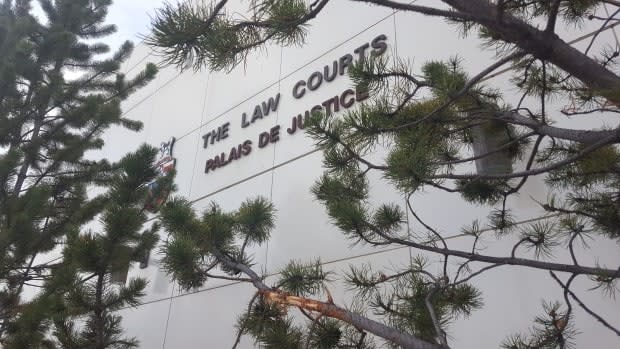Pelly Crossing woman sentenced to 4 years for 2018 Whitehorse slaying of Chelsey Bien

Despite being sentenced to four years in prison for causing the death of Chelsey Bien, Lynzee Silverfox had just one more day in custody after her sentencing hearing on Aug. 27.
Silverfox, a woman from Pelly Crossing, Yukon, pleaded guilty to manslaughter earlier this year for killing 25-year-old Chelsey Bien at her Whitehorse apartment building in 2018.
The one remaining day in custody is a result of Silverfox's time already served in custody awaiting sentencing.
After hearing the verdict, members of Bien's family in attendance immediately stood up and walked out of the courtroom gallery.
"This isn't justice, this is bullshit," one person said as he left.
Silverfox will also be subject to a three-year probation order, but will not be immediately released after her one-day term; she'll remain in custody as she awaits a trial on an unrelated murder charge.
Fatal stabbing triggered by dispute over six-pack
Silverfox, a now 23-year-old citizen of Selkirk First Nation, had originally been charged with second-degree murder in Bien's death but pleaded guilty to the lesser charge of manslaughter in May.
According to an agreed statement of facts, Silverfox and Bien were good friends and, along with two other people, had been drinking and watching movies together at Bien's apartment on Lewes Boulevard the evening of Feb. 25, 2018.
Silverfox had been "drinking heavily" the days before and consumed cocaine and crack cocaine, the statement says, and was "extremely intoxicated" that night.
She got up to leave around 12:30 a.m. and grabbed a six-pack of beer to take with her, the statement continues, but Bien protested. The two began to argue and Bien followed Silverfox toward the front door.
A neighbour reported hearing an argument between two women, with Bien yelling, "What are you going to do, stab me?" and Silverfox responding, "Do you want to see something?"
The neighbour heard "more yelling, and then silence," the agreed statement of facts says, followed by Silverfox saying "I didn't mean to do that," and "I'm sorry."
Another friend found Bien on the floor of the apartment's front entrance with blood on her shirt shortly after. She had no pulse and was pronounced dead at Whitehorse General Hospital.
Bien died from two stab wounds to her chest, an autopsy concluded.
The knife Silverfox used was never recovered.
Silverfox has "very little memory" of the argument due to her "extreme intoxication," according to the agreed statement of facts, but admits that she caused Bien's death.
Police arrested her on March 8, 2018, and she has remained in custody ever since.
A community impact statement read by Council of Yukon First Nations' worker Josie O'Brien, said that Bien's death had a wide-reaching impact on the Kwanlin Dün First Nation, of which Bien was a citizen. Many of her friends were also young, vulnerable Indigenous women who fell deeper into addiction to cope with the loss, O'Brien said, and there was "collective grief" as well as fear and anger in the community.
'Pointless' death, Crown says
Crown attorney Leo Lane, in his sentencing submission, described Bien's death as "pointless" and asked for a six-year sentence. He argued there were several aggravating factors, including the fact that Bien had trusted Silverfox and that Silverfox stabbed her twice.
He also noted that, although Bien's family had chosen not to submit victim impact statements, he knew from speaking with them that they "were and will always be devastated by Chelsey's death."
Lane asked the judge to keep in mind that while the court would be hearing a lot about Silverfox's background, Bien had many of the same experiences. However, he said that while Silverfox would have a chance to build her future, she had "robbed" Bien's family of seeing Bien do the same thing.
Silverfox's lawyer Jennifer Budgell argued a three-year sentence would be appropriate and focused heavily on Silverfox's Gladue report.
Gladue reports outline the personal circumstances of Indigenous offenders and must be taken into consideration for sentencing.
"Lynzee's Gladue report is harder to read than most," Budgell said.
The report, as summarized by Budgell, says that both of Silverfox's parents went to residential school and struggled with alcohol addiction. Silverfox and her siblings were placed into foster care when she was a baby and she faced neglect and abuse throughout her childhood.
Silverfox's mother later regained custody of her children and moved her family back to Pelly Crossing for good when Silverfox was 11. However, Budgell said Silverfox's mother regretted the move because Silverfox started abusing substances and, beginning at age 16, was sexually assaulted multiple times.
Silverfox did not have any access to supports or counselling in the community, Budgell said, and fell into a "downward spiral" after charges related to her second sexual assault were dropped when she was 19.
Budgell said that Silverfox "spent her time wisely" while at the Whitehorse Correctional Centre and is determined to change her life, completing every program available and also working consistently with a counsellor to address her addictions and trauma.
Given her age and the efforts she has so far put in, Budgell argued that Silverfox's chances for rehabilitation were strong. Silverfox had several letters of support from friends and community members.
'I want to break the cycle of intergenerational trauma'
Before hearing her sentence, Silverfox, reading from a letter, acknowledged that she had "destroyed" two families — Bien's, and her own.
Bien, she said, did not deserve what happened, and was a kind sister, daughter and friend who was connected to her culture.
"I feel so ashamed of myself, because I myself am an Aboriginal woman," Silverfox said.
"I want to break the cycle of intergenerational trauma," she added. "I know it goes deeper than alcohol."
Silverfox was allowed to hug family members and supporters in the gallery before she was brought back into custody.

